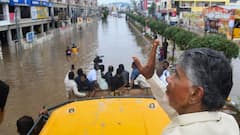What Is GO 111 And Why Its Scrapping By Telangana CM Could Make Things Worse For Water-Scarce Hyderabad | Explained
Revoking the Government Order 111 means removing the shield that protected Osman Sagar & Himayat Sagar lakes. Together, the two lakes take care of 10% of Hyderabad's total drinking water requirement.

New Delhi: Telangana Chief Minister K Chandrasekhar Rao announced on Tuesday the repealing of GO 111, over two decades after the order came into force. The erstwhile Andhra Pradesh government had issued the order in 1996 to prevent the two drinking water resources for Hyderabad — Osman Sagar and Himayat Sagar lakes — from contamination by restricting any kind of construction or industrial activity within the 10-km radius of the full tank level of the two reservoirs. The abolishing of GO will be applicable to 1.32 lakh acres of land in 84 villages that fall under the 10-km radius of the catchment area of Himayat Sagar and Osman Sagar.
Addressing the media Tuesday, the CM said the Government Order 111 has become "redundant", and that the city no longer depends on these two reservoirs as the water drawn from Krishna and Godavari rivers is adequate. He had earlier stressed that there has been a demand from local residents and realtors to revoke the GO.
According to experts, however, scrapping of the GO will give a boost to the real estate lobby. It will also impact the supply of drinking water from these two water bodies, which have a century-old history of keeping Hyderabad hydrated. The two reservoirs have been a key source of drinking water for Hyderabad, besides being an essential part of flood control and other environmental factors. The 10-km buffer zone meant to avoid any activity in the catchment areas that could pollute the lakes.
Water Scarcity Likely To Intensify
When the GO 111 was issued, it was in the interest of preventing the catchment areas of Himayath Sagar and Osman Sagar lakes. Revoking the order means removing the shield that protected these two water bodies, which together supply 10 per cent of drinking water to the city. Activists fear there will be more dependency on unsustainable water resources, i.e. Krishna and Godavari rivers.
"The drinking water required is 500-600 MGD (Million Gallons per Day). Eight projects — Osman Sagar, Himayath Sagar, Akkampalli, Manjeera, Singoor, Nagarjuna Sagar, Srisailam and Sreepada Yellampalli — provide up to 400 MGD to the people living in the city limits. Of the 400 MGD, Osman Sagar supplies 25 MGD while 15 MGD of drinking water comes from Himayat Sagar," Yellaswamy, former projects director at Hyderabad Metropolitan Water Supply & Sewerage Board (HMWSSB), told ABP Live.
With the rising temperatures, people in Hyderabad are facing water scarcity in several areas. In March, several complaints were lodged with the water board over the truncated water supply, reports said.
Hyderabad already being water-scarce, the revoking of GO 111 could make the situation worse. "After repealing this order, there will be a good mileage for real estate in the area. But with that, drinking water quality will become poor. Increased construction activities in the surrounding regions will pollute the water bodies. It will invariably lead to a reduction in supply, intensifying the water shortage issue in the city," Yellaswamy said.
CM KCR Calls Two Lakes 'Redundant'
Osman Sagar and Himayat Sagar, which the CM called "redundant", were built in 1920 and 1927, respectively, under the last Nizam-era ruler Mir Osman Ali Khan. The need for the reservoirs was felt after the devastating 1908 floods that killed thousands in Hyderabad.
Earlier, KCR said in the assembly that the city no longer needs the reservoirs because the water it gets from Krishna and Godavari rivers is adequate.
Experts, however, denounced KCR's assertion and said the state government's decision is in contempt of the high court, the National Green Tribunal and the Supreme Court.
A Supreme Court judgment upheld the GO 111 in 2020, restricting any construction activity that could pollute the lake. It had said any such industry could be unsafe for the water bodies.
Activists have been against the scrapping of GO 111. According to a report in Times of India, a few environmentalists had requested KCR to refrain from doing it soon after the CM announced his intention in the assembly in March.
Ramon Magsaysay Awardee and water conservationist Rajendra Singh took to Twitter to express surprise that Telangana, a state that hosted National Convention on Rivers on February 26, 2022, was resorting to revoking the GO 111. He had also requested the CM to not take such a decision.
Top Headlines







































